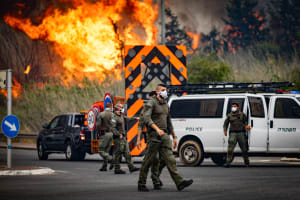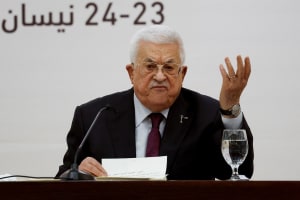Operation Iron Wall turned Jenin Refugee Camp into a ghost town: IDF says residents will be allowed to return after improvements
Counter-terror operation expands to Nablus ahead of Passover

The Israel Defense Forces (IDF) has finished its security operation in the Jenin refugee camp, the military announced earlier this week.
The Jenin refugee camp has been an incubator for various terror cells, primarily associated with Palestinian Islamic Jihad, over the past few years. Armed terrorists and wanted suspects have often hidden in the camp.
While security forces have launched several raids in the camps over the past two years, Operation Iron Wall, which started about three months ago, marked the first large-scale IDF operation in the territories of Judea and Samaria in several years.
In the operation, the security forces systematically cleared out the Jenin refugee camp, calling all residents to leave until they could deal with the terror elements there.
That activity also expanded to camps in Tulkarm and Nur a-Shams. Now, the IDF announced that it is expanding the raid into Nablus (biblical Shechem) while it is winding down its activity in Jenin.
According to a report in Ynet, the winding down of activity in Jenin is part of a “carrot and stick” policy in the Palestinian Territories, in which Israel made several concessions to the Palestinian Authority as part of an agreement to try to restore economic conditions.
As part of those concessions, the military allowed Israeli Arabs to enter the cities of Jenin (not the refugee camp) and Tulkarm for shopping, as prices there are much lower than in Israel.
Alongside this, the IDF eased some of the checkpoint restrictions near Tulkarm to allow more traffic for people coming in and out of the city.
Additionally, the security establishment granted new permits for dozens of Palestinian merchants from the Samaria region to enter Israel to sell goods.
In the Jenin refugee camp, which was completely evacuated during Operation Iron Wall, the military has allowed groups of people to return to gather belongings.
In the Tulkarm refugee camp, over the past couple days, the IDF even allowed Palestinian Authority construction equipment to enter to repair damages to roads that had been destroyed during the security forces’ operations. The IDF often uses heavy equipment to dig up the roads in order to uncover IEDs buried by the terror groups.
While many Palestinians complained about the level of destruction in the Jenin refugee camp, the military said it is planning to make several infrastructure improvements before allowing people to return.
“We are creating a network of routes throughout the camp. The idea is to turn it into a regular neighborhood,” Lt. Col. Y’ explained to Channel 12. “You can drive here, you can walk here, and this will allow us freedom of action.”
He explained that narrow alleys and close-built buildings were used by the terrorists to the disadvantage of the IDF. Widening and spacing out the roads and some of the buildings will improve both the security situation and the quality of life for residents.
The IDF plans to remain in the Jenin camp for the foreseeable future. After the roads inside the camp are widened and renovations to infrastructure are carried out, using funds contributed by donor countries, the camp's residents will also be allowed to return, the military said.
“Jenin is bustling, she wasn't so bustling for a year and a half. It's bustling like that because there's no fighting here right now. There is no fighting here because we have stopped this area of terror. And when there is no terror, it's good for everyone," the battalion commander told Channel 12.
In Jenin and Tulkarm, Israeli security forces have begun resuming cooperation with Palestinian Authority security forces to arrest wanted suspects and to seize illegal weapons.
Part of Israel’s willingness to return to the carrot and stick policy is the Palestinian Authority’s decision not to participate in strikes called by Hamas over the past few months as a result of the security operations.
However, despite reducing its operational level in the Jenin refugee camp, the IDF said it will maintain a presence there in order to prevent the recurrence of terror infiltration.
Ahead of the Passover holiday, forces from the Maglan and Duvdevan commando units, along with two reserve battalions and more forces from the Border Police, entered Nablus and Balata to preserve calm in the area over the holiday week.
The IDF also announced that two senior terrorists from the Lion's Den terror network were detained during an IDF operation in Judea and Samaria last night.
One of the terrorists, Mahmoud Banna, a senior terrorist who was involved in several shooting and IED attacks and had planned other attacks, while the other, Khalil Hanbali, was wanted for his involvement in shooting attacks and had served as an arms dealer in Judea and Samaria.

The All Israel News Staff is a team of journalists in Israel.
You might also like to read this:

















